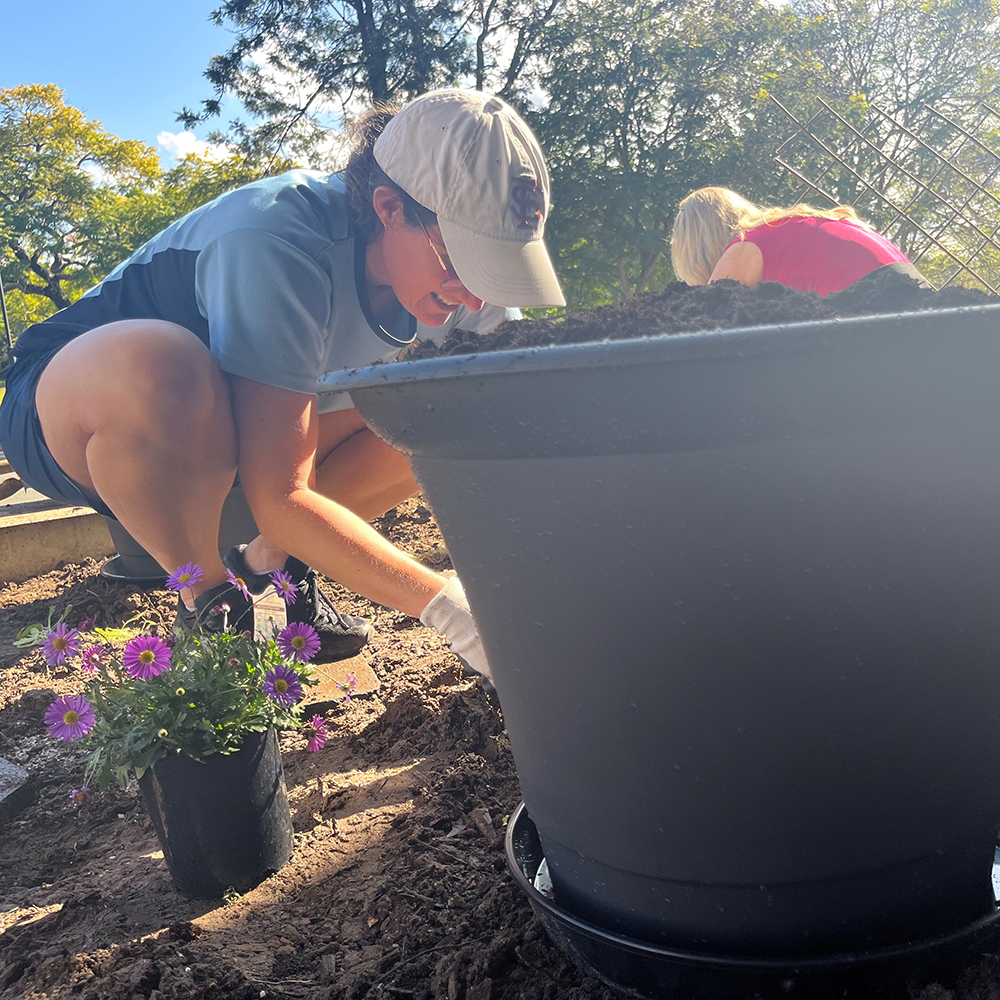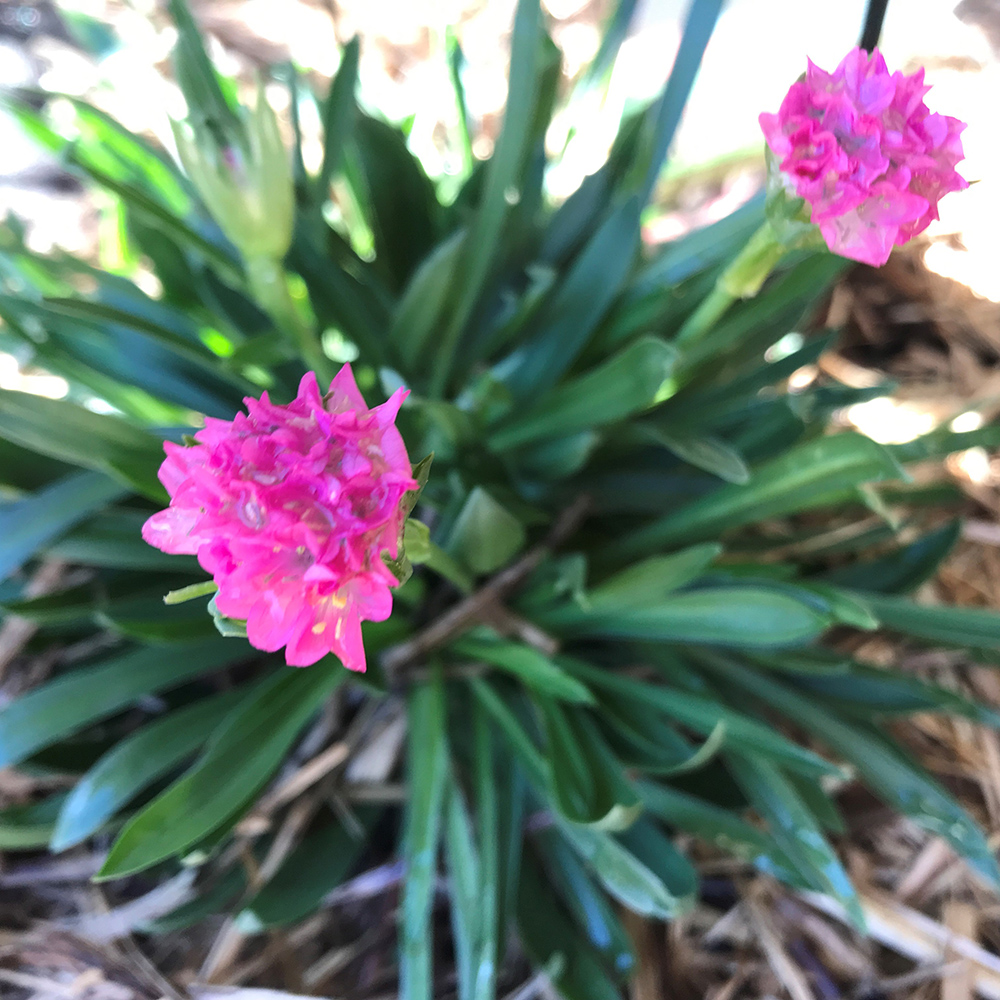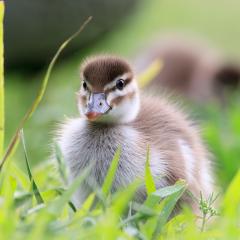Situated on the University Drive side of the Sir Llew Edwards building, UQ Business School’s new sustainability garden contains an array of native plants and edible produce that will rotate over time, according to the season.
The idea came about as part of a group pledge made by colleagues who attended the UQ Carbon Literacy Program last year. The internationally accredited program teaches participants how to think about their individual carbon emissions, as well as those of their organisations and society. It encourages people to make changes, big and small, that can help reduce their impact and improve the environment.
 After completing the course, a crew from UQ Business School banded together to launch the new garden.
After completing the course, a crew from UQ Business School banded together to launch the new garden.
“We wanted to do something that would help spread the sustainability message, but that would also give people a physical way to practise sustainability,” says Helen Lambe, an executive coordinator and the project’s driving administrative force.
“It also has the added benefits of fostering teamwork and culture, as well as providing a lovely spot to sit and chat, eat lunch or drink a cup of coffee.”
However, it was a lot of hard work to get from idea to implementation, Helen says. And it took quite a team effort! Here’s how it all came together.
Finding a location
“We started by gaining in-principle approval from the necessary parties around campus. Then we began scouting for a location,” Helen explains.
“We considered a few different options, before deciding on the easily accessible, already raised bed behind the Sit Llew Edwards building.
“Previous gardens there had fallen into disrepair, so it was a spot going to waste, which we wanted to bring back to life for everyone’s benefit,” she says.
Starting from a blank slate
The garden required careful planning. UQ Business School Media Producer, Erin Houselander, took the lead on garden design.
“At first, I threw all hopes and dreams at it,” Erin says, embodying the enthusiasm required to get a new garden project up and running.
“But I got some good advice from UQ’s horticulturalists and grounds keepers, who guided me on how to best plant to suit the site’s conditions (for example, hot afternoon sun, half sheltered from rain) and keep the project achievable.
“We eventually decided to divide the garden into two sections. So, we now have a bush tucker entry, which follows into a more Mediterranean/ market-style garden.
“All of the plants we selected are hardy enough to survive the heat, and also the inevitable dry spells – especially where the garden doesn’t naturally get rain.”
Choosing plants and garden features
Another key project contributor and Communications Manager at the Business, Economics and Law faculty, Emma Pryor, says selecting edible plants was another must-have component.
“We were looking at things like lettuces, herbs, tomatoes and some different fruits. We wanted the outputs of the garden to go back into the community and hopefully even be a great reason to have a school or faculty morning tea, among other potential workshops or events.”
On the natives side, plants such as native raspberry have been tethered to a trellised arch, while the lovely Bulbine bulbosa (more commonly known as Bulbine lily) provides a great grass-like cover.
“Another fun fact is that the majority of the flowering plants are all shades of purple, which we selected to be in-keeping with UQ’s colours,” says Erin.
Extra features include a bird bath and a bee hotel to encourage native solitary bees. A bench seat was chosen to enable people to sit and enjoy the space once it was finished.
Sourcing materials and organising people
“From there, we had to think about sourcing our materials, as well as promoting the project more broadly to gain some extra volunteers,” Helen says.
The garden received funding from both UQ Business School and the UQ Green Fund, which exists to make possible projects exactly like this one – new ideas and positive actions that individuals and teams around the University can implement at a grassroots level.
“Erin devised a (very detailed!) shopping list, also getting help from the professional coordinators who run the UQ Community Gardens on St Lucia and Gatton campuses,” Helen says.
“And then Emma wrote the spiel for spreading the word and seeking volunteers, which we publicised through various UQ Business School internal comms channels.”
Erin says she procured plants and structures from a mix of different businesses, including a local natives nursery and a speciality garden centre for some of the purpose-selected flowers and fresh herbs.
Getting our hands dirty
“The rest was all about getting our hands dirty,” Helen says.
Around 20 volunteers signed up to help, across two working bees: the first to get the soil prepared and build some of the garden structures, and the second to undertake the actual planting.
“In addition to all of its environmental benefits, the garden has proved to have immediate social value, too, through our working bees, watering schedule and ongoing maintenance,” Emma says.
“It was terrific to have so many people keen to help at the original events, and it’s also been really great to see a steady stream of new and existing volunteers putting their names down on the watering roster,” Emma says.
“Over time, we’ll be calling for volunteers for specific tasks too (for example, weeding or harvesting our produce), as well as hopefully hosting a few ‘mini events’ where we can share our bounty.”
Lovers of fresh produce and gardening should watch this space.
Enjoying the fruits of our labours
For now, it’s time to take a moment to sit back and enjoy the new space, Helen, Erin and Emma agree.
“The response from staff and students has been great. It’s a wonderful way to start a conversation about sustainability and doing small things to create change,” Erin says.
“I’ve had passers-by stop and chat to me about the garden, and I’ve been able to tell them new things, like about solitary bees and how they can play an important pollinating role just like those in a colony. It feels good to be able to have that positive impact on people’s awareness.”
 And the space is only going to become more beautiful as it grows, Emma notes. Some flowers and edible plants have already started to thrive and birds like noisy miners are coming and bathing, as the garden’s human visitors sit alongside.
And the space is only going to become more beautiful as it grows, Emma notes. Some flowers and edible plants have already started to thrive and birds like noisy miners are coming and bathing, as the garden’s human visitors sit alongside.
“While there is a short-term construction and repairs project currently taking place right near the garden, once that is complete, we should see even more people making the most of the new space,” Emma adds.
For Helen, the fruits of her labours can’t come soon enough.
“There was a lot of background work to set this up, but it’s been a great social activity,” she concludes.
“Now I can’t wait to eat some strawberries!”
Want to take more sustainability action?
The UQ Carbon Literacy Program and the UQ Green Fund both provide avenues or support for UQ students and staff to kick-start their own sustainability ideas.
UQ Carbon literacy Program
UQ Business School runs the Carbon Literacy Program, which is free for all UQ staff and students to attend. It comprises four workshops and two hours of online self-study, as well as an assessment and a pledge to gain a carbon literacy certificate. The next program roll-out will commence at the end of September. Details on registration are here.
UQ Green Fund
UQ Sustainability administers the UQ Green Fund.
Submissions for 2022 are open until 31 October. View details here or get in touch with the UQ Sustainability team if you’d like to talk about your project.






